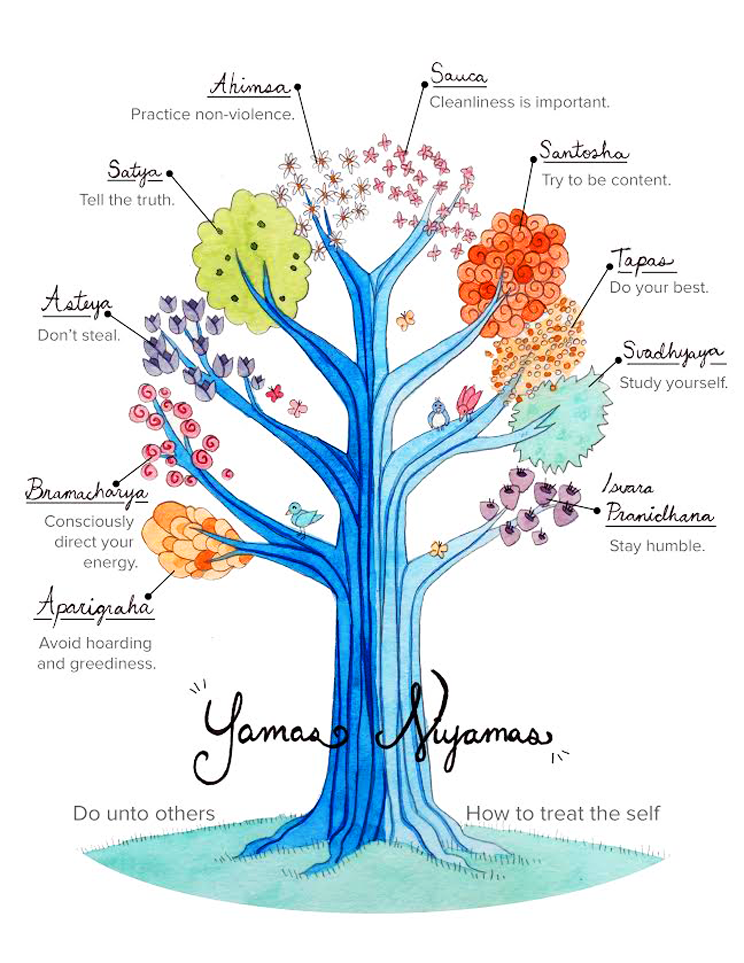Yoga = Super Powers Part 2

Yamas and Niyamas (Ethical and Self Considerations) are the rules of how to live within both Hinduism and Yoga.
Yamas – Things not to do list, impacting one’s relationships towards others and oneself
Niyamas- Things to do list, impacting how one treats and looks after oneself
Yamas and Niyamas are both personal obligations or goals and their impact or meaning on your life can only be determined by the individual. However, below I have tried to give some modern interpretations.
The Yamas and Niyamas below are according to Patanjali’s Yoga Sutras. There are many instances within the philosophical teachings of the great Guru’s and Sages with many translations and interpretations.
Yamas: Ethical Considerations
Ahimsa: Non Violence
In it’s most basic form, this means non violence to any living being. And is therefore often translated as Vegan-ism. However, it doesn’t only refer to what you eat, but in general how you treat others as well as yourself. Being compassionate, gentle, loving towards others, yourself and the environment. Being non-judgemental.
Satya: Truthfulness
Being Truthful in all ways; verbally, but also by being true to yourself. Remembering Ahimsa at the same time and having respect for others, yourself and the environment.
Aparigraha: Non Possessiveness
Practising Non-Attachment, to things and emotions. Not hoarding. Being grateful and happy with what you have and being content only having what you need not feeling unfulfilled by not obtaining possessions that aren’t needed. Avoiding jealousy.
Brahmacharya: Moderation
Traditionally this referred to being celibate! However, it can refer to all forms of moderation. Anything in extremes can be bad for you physically and mentally. Therefore practising moderation in your speech by thinking before speaking, in your behaviour, again by thinking before you act.
Having a couple of drinks with friends now and then is fine, but being drunk every night is not. Being truthful is good but rather say nothing that a truth that will hurt another person. These are examples of Moderation
Asteya: Non Stealing
In the basic sense, not stealing anything in all connotations. For example this can be interpreted as not stealing another’s time by being late. Not stealing by not hoarding that which others do not have. Most basically not taking something that you do not need or which will impact another being negatively.
As you can see, the 5 Yamas link together. By practising Ahimsa, you will automatically practice the others as you wouldn’t be untruthful as this will hurt you and others. You wouldn’t be possessive or steal as this will impact others and yourself negatively. And you would do things in Moderation, thinking before you act and speak to ensure that you do not harm others unintentionally.
It is important however, to look at these Yamas and evaluate how you interact with others and yourselves. Being late is often something that we think doesn’t really matter as it’s only a minute or two. But this can have a knock on affect to everyone’s days. Each person you interact with interacts with many others and two minutes to you could end up being a much bigger impact further down the line.

Niyamas: Self Considerations
Santosa: Contentment
Acceptance, gratitude, happiness. Accepting where you are today, that yesterday is in the past and tomorrow is in the future. Being Grateful for what you have, not discontent with the things you do not have
Saucha: Cleanliness
Looking after yourself. Having a clean body and mind. Having positive thoughts and actions
Tapas: Fiery Cleansing
Cleansing your body of toxins, both physically and mentally. Remembering that happiness is not life without pain but acceptance that the pain is an opportunity to learn non attachment and to grow from that experience. Practising Asana or any Physical exercise and Fasting are two active examples of Tapas.
Svadhyaya: Self Study
Continue to learn and grow as a person. Understand yourself. You can only learn to understand others if you know yourself completely.
Isvara Pranidhana: Devotion to the universal
This one can be tough for a lot of people. But it basically comes down to believing that there is something greater than all of us and at the same time in all of us. This can be seen through a scientific view point in that everything is made of energy or from a religious view point with a god and spirit within us all. However you interpret this, it’s worth taking the time to have an opinion.
Good luck with working through the Yamas and Niyamas and taking these steps towards Enlightenment and your Super Powers!
Next week: Asana, Pranayama and Pratyahara


Very nice write-up. I certainly appreciate this website. Stick with it!